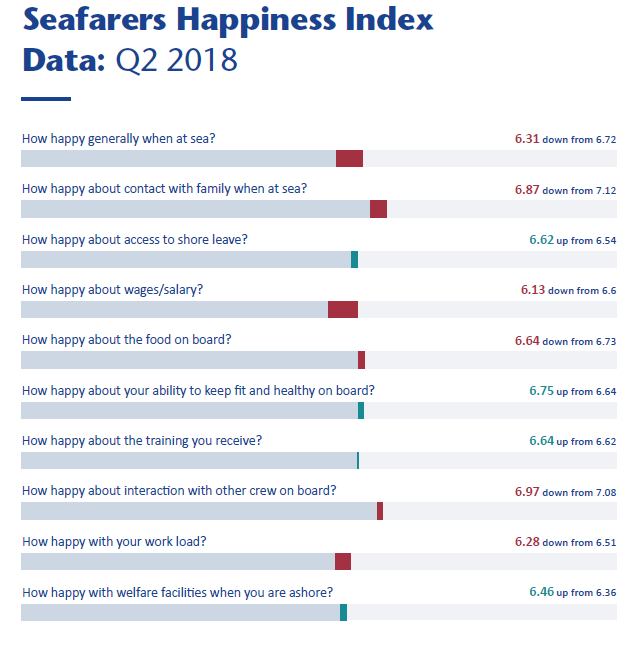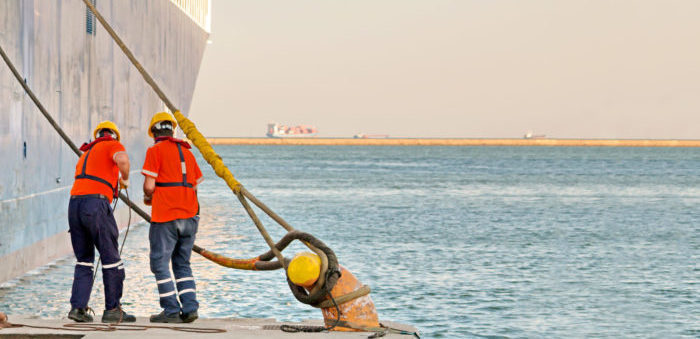Responding to the latest Seafarers Happiness Index, seafarers have called for ship owners, operators and managers to have designated human resource management in place to address concerns and to reflect the growing appreciation and importance of seafarer mental health and wellbeing onboard.
This comes as the second quarterly report of 2018 sees seafarers experience an increase in happiness in relation to physical health opportunities and welfare facilities onboard, the Mission to Seafarers informed.
These figures represent a growing trend of the importance placed on the welfare of seafarers at sea, with seafarers requesting that ship owners and managers invest in a dedicated seafarer liaison officer, who would be responsible for ensuring seafarers’ welfare whilst at sea and at port.
Speaking about the report and what it means for the industry, its Founder, Steven Jones, said:
It is enormously encouraging that seafarers are getting involved and telling us about their experience of life onboard. Awareness and talk around seafarer mental health and wellbeing is having a profound impact on how seafarers are coping.
Key findings:
- Inspections, work load, management onboard and ashore are negatively affecting seafarer happiness.
- Isolation and loneliness are felt as being major issues.
- Fatigue and stress were again mentioned repeatedly by respondents.
- There is an overwhelming sense of professional pride at working onboard ships.
- Seafarers feel that being at sea is a “lifestyle”.
- Boredom is a factor at sea. Seafarers reported trips to sea as, “killing time” and of life being “dull”.
- Some shipboard interiors were criticised as being “sterile” and “soulless”. Shared social spaces are not being sufficiently well designed or thought through.
- Connectivity is still the number one demand of seafarers. Now though, they expect better levels of service and lower costs.
- Seafarers keen to make crew internet access compulsory on all ships.
- Shoreleave restrictions, stringent security and high costs are seen as being majorly significant, and they have a negative effect.
- Shoreleave is still viewed as important, and the chance to break free from the normal routine is seen as being hugely beneficial.
- Worrying culture developing onboard which seemingly looks down on seafarers seeking to spend recreation time ashore.
- Pay “discrimination” for different seafarer nationalities is causing frustration and anger.
- Static pay levels experienced over the past few years are cause for concern

- Standard of food an issue, and seafarers accused some chandlers of sending cheaper, lower quality brands to ships.
- Catering is vitally important. The standards, experience and training of cooks is a concern.
- Food is a very sensitive issue and there can be social problems onboard where the standard of cooking or provisions are felt to be inadequate.
- Some owners deliberately run with very low levels of food onboard, allegedly. Reports of rationing.
- Exercise is a concern, and workloads combined with relentless demands mean some crew find it hard to get time to exercise.
- “Diet Dilemma” – some companies require seafarers to maintain a certain Body Mass Index (BMI) – but that their schedules and time does not factor in the exercise to help them do so.
- The health and exercise benefits of shoreleave were repeatedly stressed.
- Maritime training is seen as important, but seafarers resent the impact of training on their leave.
- The frequency and repetition of refresher training also came in for criticism
- Respondents have spoken in positive terms about their fellow shipmates, talking in terms of friendships, professionalism and support.
- Some Filipino respondents spoke in glowing terms of their interactions together, they were rather less enthusiastic about dealing with other nationalities. There were accusations of racism and bullying.
- Workloads are still reportedly high, but seafarers see little time or opportunity to get it done. This is especially true on vessels which make only short sea voyages.
- Six-hour cargo watches were singled out as a major concern.
- There were criticisms for managers and office workers ashore – a lack of experience or knowledge ashore means that seafarers are being asked to do more. Also lack of “ownership” of the issue of mental health onboard within companies.
- Paperwork is still an issue. Seafarers reported spending longer completing the paper work for a task, than the job itself.
- Seafarer welfare centres make a real difference to the quality of life for many seafarers.
In this report, seafarers have indicated they wish to have a designated point of contact who deals solely with seafarer welfare and wellbeing. This serves as a reminder of why The Seafarers’ Happiness Index is vitally important, because it acts as a dialogue between the front line of the industry and the issues concerning seafarers which they may not otherwise have a chance to talk about,
…added Mr. Jones.
For its Seafarers’ Happiness Index project, The Mission to Seafarers has been shortlisted in the ‘Initiative’ category of the 2018 SAFETY4SEA Awards, as it actually gives to seafarers a platform to share their hopes and concerns, ‘a voice to be heard’, promoting seafarers’ wellbeing.
Explore more herebelow:


































































